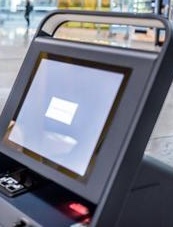 Circuit court decisions on ADA cases are sparse when compared to the number of suits filed, and cases involving self-service kiosks are rare, so it isn’t surprising the Ninth Circuit’s decision in Davis et al v. Laboratory Corp. of America Holdings, Case No. 22-55873 (Ninth Circuit, February 8, 2024) has gotten a good deal of attention. Others have looked at the holding itself, but I thought it would be a good opportunity to look at the issue of accessible kiosks generally to see how this case fits with earlier decisions and ask whether it marks a significant change in the law.¹
Circuit court decisions on ADA cases are sparse when compared to the number of suits filed, and cases involving self-service kiosks are rare, so it isn’t surprising the Ninth Circuit’s decision in Davis et al v. Laboratory Corp. of America Holdings, Case No. 22-55873 (Ninth Circuit, February 8, 2024) has gotten a good deal of attention. Others have looked at the holding itself, but I thought it would be a good opportunity to look at the issue of accessible kiosks generally to see how this case fits with earlier decisions and ask whether it marks a significant change in the law.¹
The earliest ADA lawsuit alleging that self-service kiosks were not accessible by individuals who are blind seems to be Lighthouse for Blind and Visually Impaired v. Redbox Automated Retail, LLC, No. C 12-0195 PJH, 2012 WL 12964819, at *3 (N.D. Cal. May 18, 2012). In Lighthouse the plaintiff challenged touch screen kiosks used to rent movies. The reported decision does no more than find the case could not be dismissed at the outset; it was later settled as a class action including a requirement that Redbox modify its kiosks to provide tactile keypads and text to voice software that would allow a blind person to hear and make selections. It is notable that in 2012 this solution was seen as technically feasible, which is not surprising since DOJ’s regulations concerning ATM machines and DOT requirements for airport kiosks already included the same requirement.²
A few years later a number of cases found that self-service kiosks were not required to be accessible if there was staff help available for navigating the machine. In West v. Moe’s Franchisor, LLC, No. 15CV2846, 2015 WL 8484567, at *1 (S.D.N.Y. Dec. 9, 2015) the court found that soft drink dispensing machines that could not be used by the blind did not violate the ADA because “effective assistance from Moe’s employees acting as “qualified readers” was sufficient. The court reached the same conclusion in West v. Five Guys Enterprises, LLC, No. 15-CV-2845 (JPO), 2016 WL 482981, at *1 (S.D.N.Y. Feb. 5, 2016). By 2020 the use of staff as readers for self-service kiosks the restaurant business seemed well established. In Williams v. McDonald’s Corp., No. 220CV1214TLNDBPS, 2020 WL 6561305, at *1 (E.D. Cal. Nov. 9, 2020), for example, the case was dismissed for failure to state a claim because, as the magistrate judge wrote,
defendant’s restaurants provide the option of “obtaining [sighted] assistance to operate the kiosk[.]” . . . “ADA regulations make clear that restaurants are permitted to use qualified readers to assist visually-impaired patrons with menu selections.”
The court took a slightly different approach in Natl. Fedn. of the Blind, Inc. v. Wal-Mart Associates, Inc., 566 F. Supp. 3d 383, 398 (D. Md. 2021), finding both that providing assistance was acceptable and, moreover, that no ADA standard applied to self service kiosks:
Whatever the merit of these experts’ testimony, Plaintiffs’ argument is unavailing, as the latest edition of the Design Standards expressly excludes self-checkout kiosks of this nature. The Advisory to Section 707 of the 2010 Design Standards, which governs ATMs and fare machines, provides that “[i]nteractive transaction machines (ITMs), other than ATMs, are not covered by Section 707.” . . . Here, as in Kohler, the absence of an applicable Design Standard demonstrates that Defendant is in full compliance with 42 U.S.C. § 12183, and forecloses an accessible design claim under this provision.10 A contrary ruling would require this Court to rewrite the Design Standards to fill a void that Congress and the Department of Justice left empty, and “render compliance with these regulations meaningless.
These cases all relied on DOJ’s determination that restaurants did not have to provide braille menus if a member of the staff could read the menu to a person with a vision impairment. If reading a menu was o.k., why shouldn’t the same apply to a touchscreen kiosk? They are also consistent with Redbox, for the Redbox rental kiosks are never staffed.
It is notable that none of these decisions considered the fact that creating accessible interfaces for the blind was technologically feasible. In Natl. Fedn. of the Blind v. Container Store Group, Inc., No. CV 15-12984-NMG, 2020 WL 13878557, at *6 (D. Mass. June 24, 2020), for example, the defendant was able to prevail on mootness grounds because, during the pendency of the lawsuit, it added tactile keypads and other accessibility features to its check-out kiosks. As noted above, these features had been required on ATMs and airport kiosks for years. These decisions permitted staff assistance without regard to a technological alternative.
This brings us to self-service kiosks in medical facilities. In Vargas v. Quest Diagnostics Clinical Laboratories, Inc., 2021 WL 5989961, at *6 (C.D. Cal. Oct. 15, 2021) the district court denied a defense motion for summary judgment claiming that inaccessible check-in kiosks were acceptable because human assistance was available. The ruling was consistent with the cases above because the problem was that human assistance was often not available, leaving a fact issue about whether it was an adequate substitute. By the time of the summary judgment, however, Quest had modified its kiosks to include audible instructions on how to use the kiosk to summon help and to check in without the need to include customer information that could only be done through the kiosk. There was at least a strong argument that assistance was now adequate. To avoid that argument the plaintiffs sought to certify a class of individuals who suffered discrimination because the kiosks were not “independently accessible.” In other words, they argued that having someone help with the kiosk was not enough. The Court certified a class based on that claim and, the following year, ruled in favor the plaintiffs after a four day trial. Vargas v. Quest Diagnostics Clinical Laboratories, Inc., 2023 WL 6447226, (C.D. Cal. Sept. 29, 2023). The decision rested heavily on the particular facts of the case, including the court’s finding that Quest employees were not always available to help customers who were blind or otherwise unable to use the kiosk. Quest filed an appeal in November of 2023 that is still pending.
While Vargas was moving through one court, Davis v. Laboratory Corp. of Am. Holdings, 604 F. Supp. 3d 913, 919 (C.D. Cal. 2022), aff’d, No. 22-55873, 2024 WL 489288 (9th Cir. Feb. 8, 2024) was moving on a parallel track based on claims that kiosks at Laboratory Corp facilities violated the ADA. Davis made it to the Ninth Circuit before Vargas because the defendants appealed the class certification order before there was a trial or even a motion for summary judgment.
So far this doesn’t seem very exciting. The appeal concerned class certification, not the underlying substantive claim. To certify a class action the District Court must find, among other things, that the members of the proposed class share common legal or factual issues. In the District Court whether the kiosks violated the ADA was just one of the “issues” that justified finding the commonality requirement was met. However, identifying a common issue – whether the kiosks violated the ADA – is not the same thing as making a finding of fact that the kiosks violate the ADA. At this point it looks like Vargas, with an actual finding that the ADA was violated, is the most important case.
The excitement about Davis stems in part from the sloppy way the opinion was written. In another recent 9th Circuit case³ the Court of Appeals held that proof of the facts necessary for certification of a class should be by a preponderance of the evidence. In Olean Wholesale³ the Ninth Circuit found, in agreement with many other courts, that class action plaintiff must prove that the prerequisites for certification are met by a preponderance of the evidence. None of the certification requirements include a finding that the plaintiff will win. The focus is on the issues in the case, not the ultimate outcome. In Davis the district judge cited this rule as part of his background discussion of his ruling. Notably, he did not make any finding about the ultimate issue; that is, whether the self-service kiosks violate the ADA. In fact, the judge quoted an earlier Ninth Circuit decision holding that the purpose of class certification was not “to determine whether class members could actually prevail on the merits of their claims.”
On appeal, however, the Ninth Circuit wrote as if liability had been established. It begins its opinion by announcing that it will consider whether the plaintiff has standing to sue, a question it seems to have raised sua sponte. Then, after citing to the “preponderance of the evidence” standard the Court reviews the plaintiff’s claims and concludes that the plaintiff “was denied effective communication” and has standing to sue. It appears the Court of Appeals is finding as a matter of law that self-service kiosks must be independently accessible and that the plaintiff was in fact a victim of an ADA violation. That kind of finding coming from the Court of Appeals is far more dramatic than the trial level decision in Vargas.
I don’t believe though that this is more than sloppy writing by the Court of Appeals, which may have taken a casual attitude toward the decision because it was in an unpublished opinion. A finding of standing for purposes of class certification may involve some analysis of the merits, but that analysis is not intended to be a final determination of the merits.(4) Deciding whether a customer has in fact been denied effective communication because a self-service kiosk cannot be independently accessed is, as the district court found in Vargas, the kind of factual determination that requires a trial.
Does Davis represent any change in the law? I don’t believe it does. Like Vargas it confirms that just because DOJ guidance allows waitstaff to read a menu to a blind customer and cases extend this to self-service kiosks it does not follow that every self-service kiosk is acceptable under the ADA. When, as in Vargas and Davis, the point of the kiosk is to separate staff members from customers, presumably to cut labor costs, it isn’t likely a staff member will be waiting around to help a blind customer use the self-service kiosk. Equally important, there is a difference between the personal and private information required to check in to a medical facility and a consumers choice to buy Coke instead of Fanta. One of the issues in the Container Store case was that a blind customer would have to provide their ATM PIN to the cashier. Like many other technologies, self-service kiosks are neither always unacceptable nor always acceptable. Meeting the “effective communication” requirement depends on what is being communicated under what circumstances. That has always been the law.
As a final note, this body of case law may soon be superseded by regulation. In June of this year DOJ expects to publish an NPRM for regulations that would impose on all self-service kiosks the same kind of requirements now imposed on ATM machines. For the time being Davis and Vargas illustrate a litigation threat that may be raised by plaintiffs’ firms with the ability and willingness to engage in the complexities of class action litigation. Once regulations are in effect we can expect to see a rash of serial filings by professional plaintiffs, just as happened in 2012 when the ATM regulations went into effect and again in 2015 when early court decisions found that websites had to be accessible. Restaurants and other stores relying on decisions permitting self-service kiosks should be considering how to upgrade their kiosks now, not only to better serve disabled customers, but also to avoid future litigation. Medical service providers using self-service kiosks to gather personal information cannot take any comfort from the fact driven nature of the decision in Vargas or the limited in holding in Davis because in a year or two the outcome of those cases won’t matter. Like many other technologies, touch screens were introduced as convenience for customers and businesses without much thought being given to accessibility. Now is the time for businesses to correct that oversight.
++++++++++++++++++++++++++++++++++++++++++++
¹ You should also look at Bill Goren’s analysis at and the brief summary at Seyfarth Shaw’s adatitleiii.com blog.
² See, 78 FR 67882 (DOT) and 2010 Standards for Accessible Design Sections 220 and 707.
³ Olean Wholesale Grocery Coop., Inc. v. Bumble Bee Foods LLC, 31 F.4th 651, 664 (9th Cir. 2022), cert. denied sub nom. StarKist Co. v. Olean Wholesale Grocery Coop., Inc., On Behalf of Itself and All Others Similarly Situated, 143 S. Ct. 424 (2022)
(4) The distinction between a finding on the merits and the finding necessary to certify a class is described in various ways, but it is clear that as a rule certification of a class is not a determination of the merits. Koss v. Norwood, 305 F. Supp. 3d 897, 915 (N.D. Ill. 2018) includes a good discussion of the various considerations. Without getting too far into the weeds of class certification, it is notable that the Ninth Circuit did not tie the standing issue to any of the four elements required for class certification, and it is those elements that require a preponderance of the evidence. The Ninth Circuit affirmed a class certification order, not a determination that in this particular case the self-service kiosks violated the ADA because there was no such determination in the trial court, which described the kiosks as “allegedly inaccessible”


 I’ve been busy in the last few months putting what I learn from reading new decisions about the ADA and FHA to use for my clients; hence this delayed blog. A number of interesting decisions concerning ADA website litigation came out while I was busy on my day job, and I hope you don’t mind the delay in getting them to you.
I’ve been busy in the last few months putting what I learn from reading new decisions about the ADA and FHA to use for my clients; hence this delayed blog. A number of interesting decisions concerning ADA website litigation came out while I was busy on my day job, and I hope you don’t mind the delay in getting them to you. August is (in Texas at least) the month of afternoon thunderstorms. It’s a good metaphor for running a business subject to the ADA or FHA. Everything’s sunny and warm one minute then suddenly the wind is blowing and you are soaking wet. But the plants need the rain, so as usual there’s good and bad in ADA and FHA developments.
August is (in Texas at least) the month of afternoon thunderstorms. It’s a good metaphor for running a business subject to the ADA or FHA. Everything’s sunny and warm one minute then suddenly the wind is blowing and you are soaking wet. But the plants need the rain, so as usual there’s good and bad in ADA and FHA developments.
 “Short sharp shock” is too good a phrase not to re-use, as proved by the fact that after its first use by Mary I of England to describe her hope that burning a few protestants would bring others back into the fold and its popularization by Gilbert and Sullivan it turned up in a song by Pink Floyd and as the title of Michelle Shocked’s first album. My use probably won’t get added to the Wikipedia page on the phrase (7) but it suits a discussion of braille gift card litigation and the effect of TransUnion v. Ramirez in ADA litigation.
“Short sharp shock” is too good a phrase not to re-use, as proved by the fact that after its first use by Mary I of England to describe her hope that burning a few protestants would bring others back into the fold and its popularization by Gilbert and Sullivan it turned up in a song by Pink Floyd and as the title of Michelle Shocked’s first album. My use probably won’t get added to the Wikipedia page on the phrase (7) but it suits a discussion of braille gift card litigation and the effect of TransUnion v. Ramirez in ADA litigation.